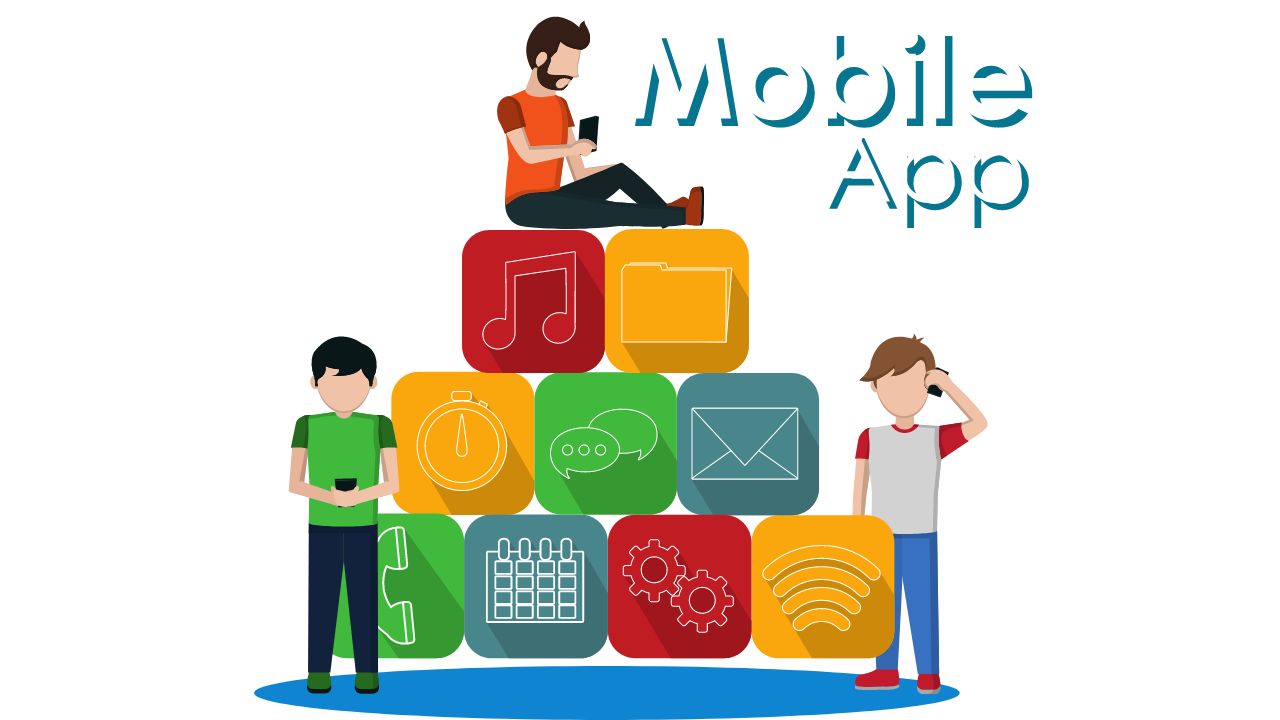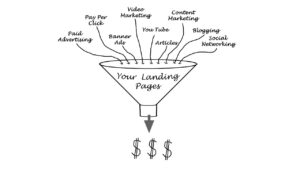A mobile app is software designed for portable devices like smartphones and tablets. These programs are accessible for download via marketplaces or app stores specific to the platform they were designed for, such as Apple’s App Store for iOS devices and Google Play for Android devices.
Affiliate Disclosure: Some links on this website are affiliate links. To read full affiliate disclosure, click HERE
Smartphone apps offer various capabilities, including social networking, entertainment, and utility. While some programs require an internet connection to function, plenty doesn’t. Mobile apps are frequently developed for specific operating systems, such as iOS, Android, or Windows, and may be adjusted for different screen sizes and resolutions..
Examples of Popular Mobile Apps
Many mobile apps are available for various purposes and interests, and new apps are constantly being developed and released.
a. Messaging apps – WhatsApp, Telegram, and Signal.
b. Gaming apps – Candy Crush, Pokemon Go, and Fortnite
c. Financial management apps – Mint, PayPal, and Robinhood.
d. Productivity apps – Microsoft Office, Trello, and Evernote.
e. Social media apps – Facebook, Instagram, and Twitter.
f. Entertainment apps – Netflix, YouTube, and Spotify.
g. Navigation apps – Google Maps, Waze, and Apple Maps.
f. E-commerce apps – Amazon, eBay, and Alibaba.
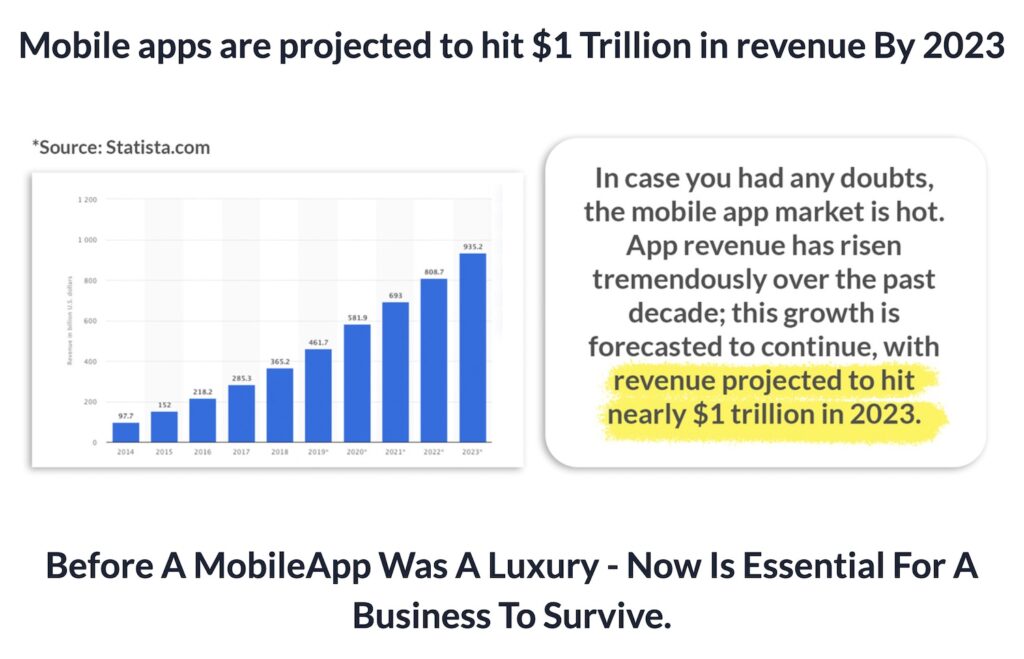
Why You Should Learn How To Make Mobile Apps
Learning how to create mobile apps could be useful for various reasons.
Employment Opportunities:
There is a considerable need for skilled developers as the market for mobile apps expands and mobile devices gain popularity. Mobile apps may increase employment in e-commerce, gaming, and software development.
Entrepreneurship:
It is possible to make money with mobile apps. Anyone with knowledge of mobile app development can start their own business, produce goods, and provide services. Mobile apps could become successful businesses with the appropriate planning and execution.
Innovation and creativity:
Designing mobile apps requires imaginative thinking, logical reasoning, and problem-solving abilities. Everyone may utilize their imagination to build programs, try out novel concepts, and solve pressing issues.
Personal Development:
Making mobile applications can help people improve themselves. People can increase their self-esteem, broaden their technical knowledge, and push themselves to think creatively by learning new skills.
Anyone interested in technology, entrepreneurship, or creativity may find creating mobile apps intriguing and fulfilling.
How to Develop a Mobile App
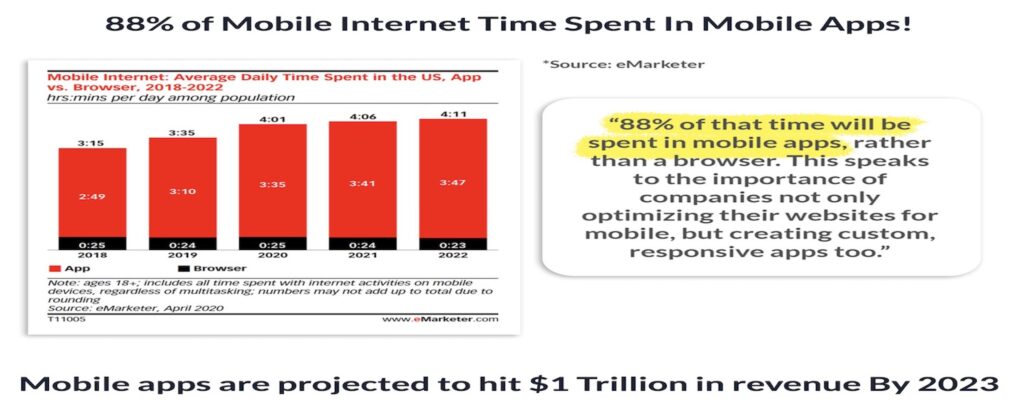
Developing a mobile app can be challenging, but it is possible to create apps. Here are the general steps involved:
Description of the proposed app:
When establishing your idea, ascertain the problem it solves or the need it fills. Do market research to ensure a market for your app idea.
Create your app plan:
Create a plan that considers the functionality, target market, and design. Create a simple wireframe to visualise the flow of the screens in your app.
Choose your platform and technology stack:
Decide if you want to build your app for iOS, Android, or both platforms. Next, choose the frameworks, programming languages, and libraries for your app’s technology stack.
Develop your app:
Develop your app based on your wireframe and plan. Create a back-end infrastructure like a server and database to support your app.
Test your app:
Make sure your software is functioning correctly and is free of bugs by testing it. Use testing tools like emulators to simulate various hardware and software platforms.
App store submission:
Upload your app per the guidelines to the app stores, such as Google Play or the App Store.
Launch and promote your app:
Several ways to advertise your app include social media, app store optimisation, and paid search.
Monitor and update your app:
Monitor user feedback and app reviews, and make the required updates to improve usability and functionality.
This is a brief overview of the steps involved in creating a mobile app; additional steps may be required depending on your app’s complexity and the size of your team.
Lorem ipsum dolor sit amet, consectetur adipiscing elit. Ut elit tellus, luctus nec ullamcorper mattis, pulvinar dapibus leo.
Want to learn how to develop Mobile Apps? Join a 28-days App development certification
How To Make Money As An App Developer
Creating apps for customers/clients:
Developers can earn money by making specific mobile applications for businesses or individuals willing to pay for their services. This can mean billing hourly or basing work on projects.
Creating and selling their apps:
Mobile app developers can create and market their apps via stores like Google Play or the App Store. They can generate income through in-app sales, subscription services, or advertising.
Offering app development services in freelance markets:
Like Upwork and Freelancer, app developers may offer their skills and compete for employment designing apps for clients worldwide.
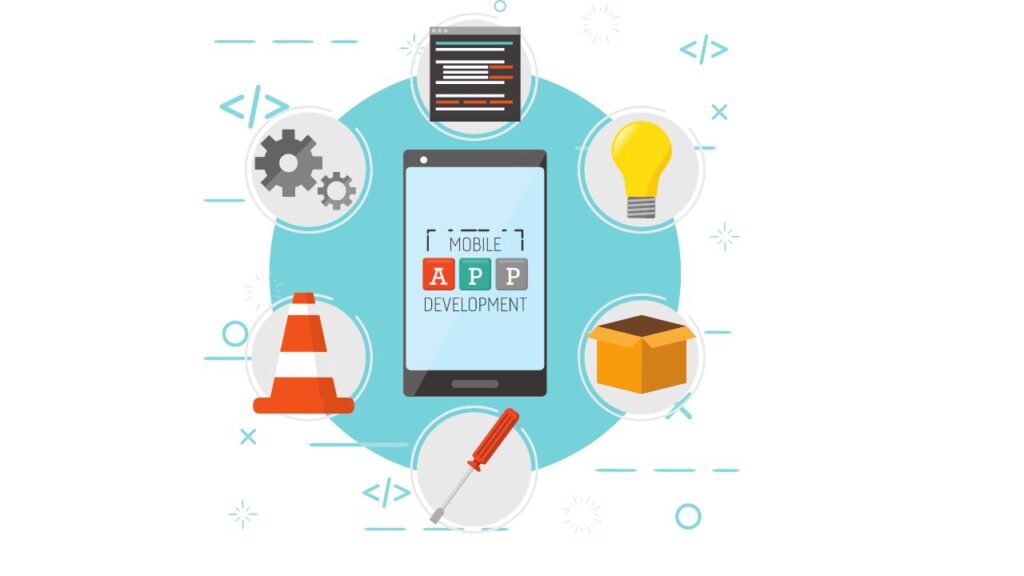
Providing app development training and consulting services:
Experienced developers can assist people or organisations in learning how to create their mobile apps or improve their existing apps.
Participation in app development contests:
A few companies and organisations reward contest winners with cash awards. Developers can compete in these events to show off their skills and earn money.
Overall, an app developer will be financially successful. Still, it also depends on the developer’s skill, experience, and ability to create applications that customers would find helpful.
Adds inside the app:
Showing advertisements inside the app is a typical approach to making money. To monetise their apps, app owners can charge advertisers for the right to display their advertising, or they can use ad networks like AdMob or Facebook Audience Network.
Sell virtual products:
App owners may make virtual products or premium features available. These purchases can be made, and some proceeds will go to the app’s owner.
Subscription models: Charge recurring fees. App owners can charge users a recurring fee, such as a monthly or annual subscription, to access premium content or features.
Partnerships and sponsorships:
App owners can work with brands or businesses to give their users exclusive content or deals. Via sponsorships or referral fees, these alliances may produce income.
Sell own app:
App owners can sell their apps to investors or buyers for a one-time payment. This is more typical for well-known apps with a track record of success in user engagement and income.
Of course, the type of mobile app and its intended audience will determine the specific monetization plan.
Want to learn how to develop Mobile Apps? Join a 28-days App development certification
Other Ways To Make Money With Mobile Apps
In-app advertising:
A common strategy is to make money by displaying adverts inside the app. App owners have two options for generating revenue from their apps: they can charge advertisers for the right to display their ads or use ad networks like AdMob or Facebook Audience Network.
In-app purchases:
Owners of apps may provide virtual goods or premium features for sale within the app. Real money can make these transactions; a portion goes to the app’s owner.
Subscription-based business models:
App owners may charge users a reoccurring price, such as a monthly or annual subscription, to access premium material or services.
Partnerships and sponsorships:
App owners can work with companies to offer users privileged content or promotions access. These agreements may generate revenue through sponsorships or referral fees.
Selling the app:
App creators can sell their apps to investors or customers for a one-time fee. This is more usual for popular apps with a financial and user engagement success history.

Where To Get Customers/Clients For Mobile Apps
Restaurants:
Customers can use users to order food for pickup or delivery, reserve tables, and learn about menu items and specials. Other features of restaurant applications include payment options, virtual waitlists for seating control, and loyalty programs.
Entertainment:
With their mobile devices, users can download apps for games, music streaming services, and video streaming services to pass the time.
Social networking:
Users can connect with friends and family, share updates, and have conversations via social media apps.
Communication:
Email, voice and video conversations, and messaging apps can all be used for user-to-user communication.
Productivity:
Users better organise their schedules, set reminders, and work using productivity applications.
E-commerce:
Consumers may shop online, track their orders, and receive updates about sales and promotions using shopping applications.
Fitness and health:
By using apps for health and fitness, users can monitor their food and nutrition, assess their physical activity, and receive recommendations on how to stay healthy.
Travel:
Users can plan their holidays, book lodging and flights, and discover local attractions and activities using travel-related applications.
Education: Besides in-class instruction, professors and students can manage courses and assignments using educational software.
Banking:
By monitoring account balances, moving money, paying bills, depositing checks in the bank, and managing credit cards, users of banking apps may manage their finances.
Navigation:
Users can use navigation apps to look for nearby points of interest, receive turn-by-turn instructions, and receive real-time traffic information.
Augmented Reality:
Users can overlay virtual objects or data in the real world using augmented reality (AR) apps to create fun and interactive experiences. Applications for augmented reality can be used for various purposes, including gaming, education, and retail.
Conclusion
Not to mention, developing a mobile app and earning money from it can be a challenging but rewarding process. Suppose you carefully plan and carry out your app development project, research the best revenue models, and invest in effective marketing strategies.
In that case, you may create a profitable mobile app that benefits your business. If you choose the right approach and are committed to quality, your mobile app idea can come to fruition.
Want to learn how to develop Mobile Apps? Join a 28-days App development certification
Introducing Zapable: The Ultimate Mobile App Builder for Business Owners and Entrepreneurs
You want to create a mobile app for your business or product but need more resources (money, time, or technical know-how).
There is no better mobile app creator for business owners and entrepreneurs than Zapable. The platform’s user-friendly interface allows you to easily create stunning, original mobile apps without any prior coding knowledge.
Key benefits include:
- Designing a high-quality mobile app can be done without coding expertise or experience.
- Modifiable templates – Choose from various expertly made templates or develop your own from scratch.
- User-friendly interface – Any application component can be easily added, modified, and customised thanks to the platform’s straightforward design.
- Uploading your app to Google Play and the App Store is simple.
- Affordable costs – choose from various options that meet your spending plan.
Key Features:
A drag-and-drop editor that makes it simple to add images, videos, text, and more to your app is one of its features.
- Push Notifications: Our push notification feature keeps users updated and involved.
- Loyalty and reward programs – With easy-to-set-up and -maintain loyalty and reward programs, repeat business can be encouraged.
- E-commerce integration: You can directly sell products and services using the app’s e-commerce integration features.
- By connecting the app to their social media accounts, users can share content with friends and followers.
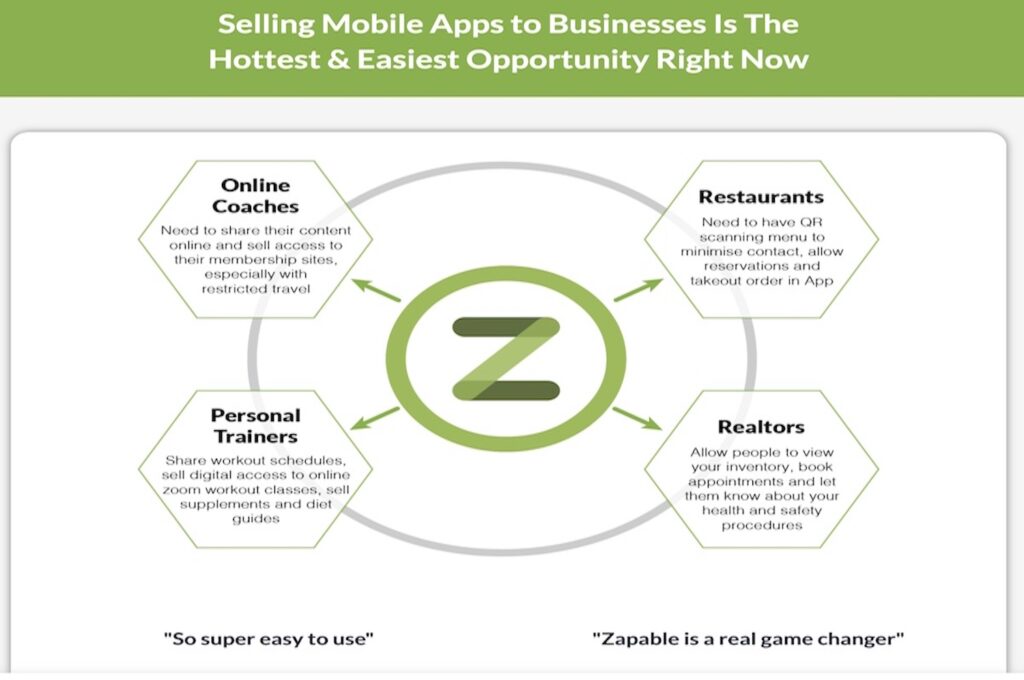
Call-to-Action
Are you ready to create a unique mobile application for your business or sale?
Join Zapable immediately to learn how simple it is to develop a high-quality app in only a few minutes.

